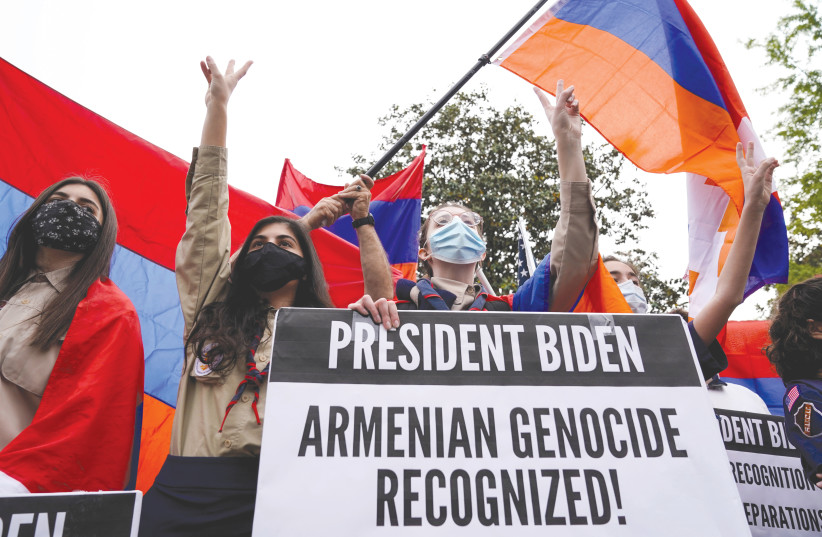In late February, New Jersey Gov. Phil Murphy posted a tweet that sent shock waves throughout the Armenian-American community in New Jersey. He issued a false statement that extolled the corrupt government of Azerbaijan by recognizing the “Khojaly Genocide” that was both historically inaccurate and ill-timed.
By doing so, the governor essentially inserted himself into the ongoing conflict between Armenia and Azerbaijan over the disputed territory of Nagorno-Karabakh, which is part of historical Armenia.
Since the fall of 2020, Azerbaijan, a country led by the petro-dictator Ilham Aliyev, has escalated tensions with Armenia by launching an illegal war and attacking the territorial integrity of Armenia.
For the more than 100,000 Armenians living in New Jersey, they see these latest acts of aggression by Azerbaijan, one of the most repressive and autocratic countries in the world, as a continuation of the 1915 Armenian Genocide, when more than 1.5 million Armenians were systemically exterminated by the Ottoman Turks.
It is an event that both the Turkish and Azerbaijani governments deny to this day. They see it as an existential threat to their very existence.

It is also why Armenian-Americans in New Jersey found the governor’s use of the word “genocide” to describe what took place at Khojaly as offensive and inaccurate. For starters, the governor is wrong.
Genocide against the reality of the situation
What happened in Khojaly 31 years ago has been twisted and distorted by the Azerbaijani propaganda machine over time. For most of 1991 and 1992, Azerbaijan was using Khojaly as a staging ground to launch rocket attacks against Armenian civilian targets. The continuous shelling almost led to the near-total destruction of Stepanankert, the capital of Nagorno-Karabakh.
As part of an attempt to neutralize enemy fire, Armenian self-defense forces attacked Khojaly on February 25, 1992, at 11:30 p.m. But before doing so, Armenian forces warned the civilian inhabitants of Khojaly of an imminent attack and even provided a safe corridor for them to leave. The Azeri authorities did nothing to protect their own people.
What followed has been a relentless anti-Armenian campaign that lacks any evidence of “genocide” and blatant subterfuge by the Azerbaijan government. It’s straight out of the Azeri playbook of using the pretext of historical revisionism to rewrite and reimagine the past. Khojaly is just another example of that strategy.
To support this false narrative, Azerbaijan used images of mutilated and dead bodies as proof for “genocide,” which subsequently turned out to be fake and doctored photos. There is even evidence that Azerbaijan moved and transported dead bodies to the region in an attempt to inflate the number of casualties.
There is no denying that deaths happened on both sides, but to suggest that a genocide occurred is an insult to Armenians who have fought for decades to have their own genocide recognized by the United States. Genocide is a term that should not be used loosely. It is one of the many reasons why the governor needs to set the record straight and remove his tweet and apologize for his misleading statement.
Not only is Gov. Murphy on the wrong side of history but his statement was issued at a time when the government of Azerbaijan continues to persecute Armenians. Since early December, Azerbaijan has implemented a blockade to the only road connecting Nagorno-Karabakh with Armenia, which has rapidly become a humanitarian crisis.
By cutting off the only link to the outside world, Armenians living in Nagorno-Karabakh have been denied much needed supplies like food, medicine, and heating gas, as temperatures drop to freezing levels.
This burgeoning humanitarian situation has led Human Rights Watch, Amnesty International and Pope Francis to voice their concern for the 120,000 Armenians living in Nagorno-Karabakh, including 30,000 children who are being deprived of basic human rights. And last month, the UN’s International Court of Justice ordered Azerbaijan to end its blockade.
This blockade follows a troubling pattern of Azeri aggression towards Armenians and is part of their ongoing campaign to ethnically cleanse Armenians from the region.
Gov. Murphy should also be concerned about recent statements from President Aliyev that reflect his true intentions. In recent speeches and statements, Aliyev has unequivocally claimed that Armenia is their historical land while calling Armenia “Western Azerbaijan” and even saying that Yerevan, the capital of Armenia, belongs to Azerbaijan.
Azerbaijan is promoting a culture of hate and fear and is breeding a whole new generation of anti-Armenian sentiment. It’s dangerous. It’s irresponsible. It needs to stop.
But in many ways, the governor’s tweet in praising Azerbaijan over a fabricated history, is only perpetuating this type of hate and validating their actions. Whether Murphy issued the statement directly or was made by a member of his staff, the governor needs to take responsibility and ownership of what was said and know that it can be misinterpreted and used for nefarious purposes.
Armenian-Americans have played a large role in New Jersey’s history and have contributed significantly to the cultural and business fabric of the state. That is why many of them were surprised and taken aback by the governor’s statement.
Armenian-Americans in New Jersey are still grappling with the effects of the 1915 Armenian Genocide. And for many of them, New Jersey became a place where they found refuge and were welcomed with open arms. They need to know if New Jersey is still that place.
They need to know if their governor still has their back. They need him to retract his statement and issue an apology. They need him to hold Azerbaijan accountable – not praise them. Only then, will he be able to regain trust with one of the state’s most vibrant and prosperous communities.
The writer is a communications strategist who grew up in Bergen County, NJ and now lives in the San Francisco Bay Area. He’s a first-generation Armenian-American and grandson to survivors of the Armenian genocide.
